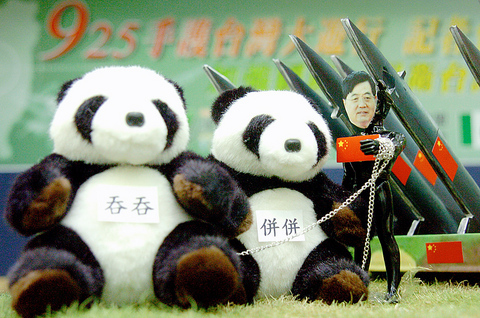Since a bill that would allow Taiwan to purchase three major weapons systems from the US has been blocked by the pan-blue alliance in the legislature 26 times, a pro-independence group yesterday announced that it will launch a "large-scale" march on Sept. 25 in Taipei City to call on the opposition parties to abandon their boycott of the bill.
The group behind the march, the pan-green supported Hand-in-Hand Taiwan Alliance, yesterday announced its plan to hold the march, while Democratic Progressive Party (DPP) Chairman Su Tseng-chang (
The head of the alliance, Ng Chiau-tong (

PHOTO: SEAN CHAO, TAIPEI TIMES
However, Ng said, the KMT later collaborated with its ally the People First Party, to boycott the procurement deal simply because of their desire to oppose the DPP government.
"The pan-blue camp's irrational actions have jeopardized Taiwan's security and allowed the military balance between Taiwan and China to deteriorate," Ng said.
Therefore, Ng said, the alliance will hold a "large-scale" march on Sept. 25 in Taipei City with the assistance of the World Taiwanese Congress, another pro-independence group.
The special arms procurement budget bill is designed to provide the funding for Taiwan to purchase three PAC-3 Patriot anti-missile batteries, 12 P-3C Orion maritime patrol aircraft and eight diesel-electric submarines from the US. The purchase of the items would cost NT$480 billion (US$15 billion).
Critics of the deal describe it as costly and unnecessary, while supporters say it is vital to ensure that Taiwan can defend itself against Chinese aggression.
Ng said that the congress has invited President Chen Shui-bian (
Su said that the US does not understand why the arms sale has been delayed in the legislature for so long, and that many US officials believe it is now time for the people of Taiwan to express their resolve and do more to protect their homeland.
Otherwise, no one would be willing to help Taiwan if it was faced with an imminent Chinese invasion, Su said.
Shu agreed with Su, saying that national defense is the basis for a nation, and that there could be no such thing as sovereignty for a nation if its national security is endangered.
Both leaders called on supporters to participate in the march, promising that they would help the march to succeed.
also see story:
PFP lends conditional support to weapons budget

Taiwan is gearing up to celebrate the New Year at events across the country, headlined by the annual countdown and Taipei 101 fireworks display at midnight. Many of the events are to be livesteamed online. See below for lineups and links: Taipei Taipei’s New Year’s Party 2026 is to begin at 7pm and run until 1am, with the theme “Sailing to the Future.” South Korean girl group KARA is headlining the concert at Taipei City Hall Plaza, with additional performances by Amber An (安心亞), Nick Chou (周湯豪), hip-hop trio Nine One One (玖壹壹), Bii (畢書盡), girl group Genblue (幻藍小熊) and more. The festivities are to

Auckland rang in 2026 with a downtown fireworks display launched from New Zealand’s tallest structure, Sky Tower, making it the first major city to greet the new year at a celebration dampened by rain, while crowds in Taipei braved the elements to watch Taipei 101’s display. South Pacific countries are the first to bid farewell to 2025. Clocks struck midnight in Auckland, with a population of 1.7 million, 18 hours before the famous ball was to drop in New York’s Times Square. The five-minute display involved 3,500 fireworks launched from the 240m Sky Tower. Smaller community events were canceled across New Zealand’s

‘IRRESPONSIBLE’: Beijing’s constant disruption of the ‘status quo’ in the Taiwan Strait has damaged peace, stability and security in the Indo-Pacific region, MOFA said The Presidential Office yesterday condemned China’s launch of another military drill around Taiwan, saying such actions are a “unilateral provocation” that destabilizes regional peace and stability. China should immediately stop the irresponsible and provocative actions, Presidential Office spokeswoman Karen Kuo (郭雅慧) said, after the Chinese People’s Liberation Army (PLA) yesterday announced the start of a new round of joint exercises around Taiwan by the army, navy and air force, which it said were approaching “from different directions.” Code-named “Justice Mission 2025,” the exercises would be conducted in the Taiwan Strait and in areas north, southwest, southeast and east of Taiwan

UNDER WAY: The contract for advanced sensor systems would be fulfilled in Florida, and is expected to be completed by June 2031, the Pentagon said Lockheed Martin has been given a contract involving foreign military sales to Taiwan to meet what Washington calls “an urgent operational need” of Taiwan’s air force, the Pentagon said on Wednesday. The contract has a ceiling value of US$328.5 million, with US$157.3 million in foreign military sales funds obligated at the time of award, the Pentagon said in a statement. “This contract provides for the procurement and delivery of 55 Infrared Search and Track Legion Enhanced Sensor Pods, processors, pod containers and processor containers required to meet the urgent operational need of the Taiwan air force,” it said. The contract’s work would be